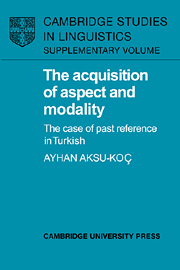Book contents
- Frontmatter
- Contents
- List of figures
- List of tables
- Acknowledgements
- Symbols and abbreviations
- PART I TENSE, ASPECT AND MODALITY IN ACQUISITION
- PART II DEVELOPMENT OF PAST REFERENCE IN TURKISH: FROM ‘PERFECT’ ASPECT TO ‘EVIDENTIAL’ MODALITY
- 4 The empirical study: rationale and hypotheses
- 5 Longitudinal study of early inflectional development
- 6 Experimental study of the production of the pasts of direct vs. indirect experience
- 7 Experimental study of the comprehension and metalinguistic awareness of the pasts of direct vs. indirect experience
- 8 Production and comprehension of the quotative function
- PART III CONCLUSIONS AND GENERAL IMPLICATIONS
- Appendix A
- Notes
- Bibliography
- Subject index
- Name index
7 - Experimental study of the comprehension and metalinguistic awareness of the pasts of direct vs. indirect experience
Published online by Cambridge University Press: 23 September 2009
- Frontmatter
- Contents
- List of figures
- List of tables
- Acknowledgements
- Symbols and abbreviations
- PART I TENSE, ASPECT AND MODALITY IN ACQUISITION
- PART II DEVELOPMENT OF PAST REFERENCE IN TURKISH: FROM ‘PERFECT’ ASPECT TO ‘EVIDENTIAL’ MODALITY
- 4 The empirical study: rationale and hypotheses
- 5 Longitudinal study of early inflectional development
- 6 Experimental study of the production of the pasts of direct vs. indirect experience
- 7 Experimental study of the comprehension and metalinguistic awareness of the pasts of direct vs. indirect experience
- 8 Production and comprehension of the quotative function
- PART III CONCLUSIONS AND GENERAL IMPLICATIONS
- Appendix A
- Notes
- Bibliography
- Subject index
- Name index
Summary
Children's knowledge of the modal distinction between the inferential past and the past of direct experience was also studied from the point of view of comprehension. An experimental study was carried out to find out whether young children understand that a speaker who refers to a situation in -mlş past has not witnessed the event itself but is making an inference from its observable results, while one who refers to a situation in -DI past has experienced it directly. It was also of primary interest to uncover the underlying procedures that are at work in achieving such comprehension. Based on the assumption that these covert processes can be inferred from the justifications children give for their performance on the task, an additional analysis was performed on the data. This analysis, then, also reflects the metalinguistic awareness gained by the subjects during the course of the experiment.
Procedure
The subjects were presented with eight short story-like events each represented by a sequence of four pictures. All the story items involved the same characters and were introduced as the adventures of three friends, two boys and a girl (Ali, Ahmet and Fatoş). The subjects were told that this was a game called ‘Find out who said it’. At the end of each story, the investigator produced an utterance making a statement about the event in the story, and asked the child to identify its speaker in the last picture of the sequence.
- Type
- Chapter
- Information
- The Acquisition of Aspect and ModalityThe Case of Past Reference in Turkish, pp. 136 - 158Publisher: Cambridge University PressPrint publication year: 1988



